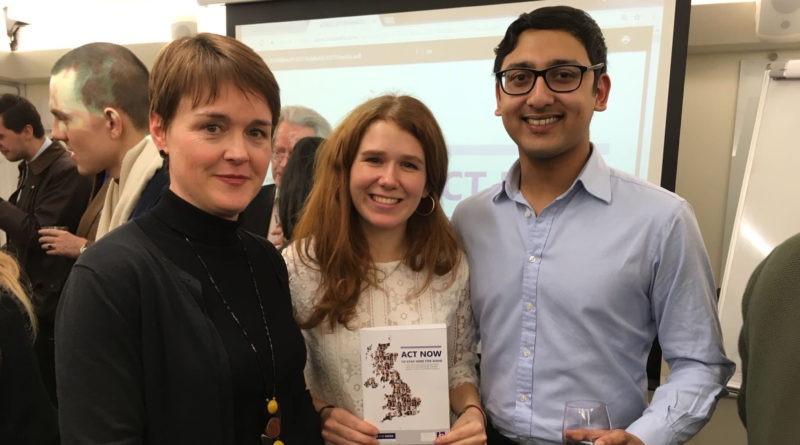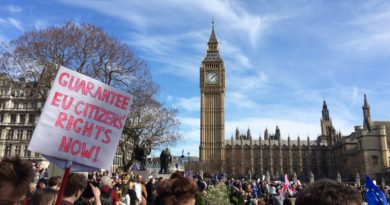‘Here for Good’, new legal service for EU nationals in UK
There couldn’t be a clearer name for an organisation that wants to help EU nationals to stay in the UK after Brexit. Launched this week, the group is called Here for Good. Its aim is to offer free legal assistance to those who need it the most in the context of Brexit.
The charity was set up by Tahmid Chowdhury and Isabella Mosselmans. Tahmid works in public affairs at M&C Saatchi and has twice been nominated for Forbes 30 Under 30 in law & policy. He is also a co-founder of The People’s Challenge, a crowdfunded group that participated in the litigation against the UK government led by Gina Miller. They argued – winning – that the government could not notify the intention to leave the European Union without the parliament approval.
Isabella Mosselmans, the other founder, is a trainee solicitor at Wesley Gryk, a law firm specialised in immigration and asylum. In her spare time, she also works at South West London Law Centres, running their free legal advice clinics.
Their first initiative at Here for Good is a self-help guide to help people understand the UK permanent residence and citizenship system. This was prepared in cooperation with senior partners at law firms Wesley Gryk and Bindmans and is available for free at the Here for Good website. The long-term plan, however, is to expand activities and offer a fully-fledged free legal service for citizens of the European Union and the European Economic Area who live in the UK, especially those outside London.
“Working with lawyers on the Article 50 case, we realized that there would be a lot of people in need of legal help, so we started to build the basis of a new organisation,” Tahmid Chowdhury told Europe Street News.
How did you get the idea?
After the EU referendum, even within my immediate network of lawyers and academics, there were many people of European nationalities wondering what to do. They were finding the permanent residence process complicated. I thought it must have been twenty times more difficult for those who did not know these issues at all. So we looked into what was available in terms of legal support and we found that there are advisory services, but only a few outside London.
What is your plan now?
We want to provide completely free legal support to people who can’t afford it. We did a lot of research on the services available in different areas of the UK in relation to population size and presence of EU nationals. Soon we will launch a fundraising campaign. Our target is to raise 175,000 GBP to hire caseworkers based in the areas of the UK most in need. We intend to build partnerships with other law firms operating in these areas, sponsoring an employee to work with them. We are also keen to work with other groups and anyone who can help us achieve our objectives.
Is this a short-term project to deal with the Brexit crisis or do you plan to create a structure that lasts in the long term?
We are looking at a period of at least 5 years, when EEA citizens will be affected by policy changes which are still partly unknown. Citizens’ rights will not be guaranteed until the Brexit deal is signed. The best-case scenario will require 2 to 4 years of support and advice for the most complicated cases, for example non-EU family members of EU nationals. In the worst-case scenario, that is a no-deal, no one knows really what is going to happen. We will keep updating the guide at any policy change.
You mentioned the rights of non-EU family members, which is a concern for many people at the moment as it has not been fully agreed in Brexit negotiations. Is there any other major complication you can anticipate?
Irish citizens may face quite complicated arrangements. They will be either better or worse off than other EU citizens and it is unclear which extra pieces of legislation will apply besides the EU’s. The continuation of free movement across Ireland and UK [with the return of the pre-EU Common Travel Area] is incredibly complicated. In the case of a hard border in Northern Ireland, it will be difficult to define where British and Irish laws start for Irish citizens, and it will be difficult for dual nationals to determine whether their rights will be protected under EU law or they will be treated as British citizens.
What about British citizens who live in the rest of Europe?
At the moment we focus on EEA citizens in the UK. We would like to make guides and advisory services available in other countries such as Spain, where there is a large community of British citizens. But things are complicated by the fact that every country has different rules on immigration. Ideally we would like to make partnerships with other individuals and organisations so that they can replicate our model.
Claudia Delpero © all rights reserved.
Photo: Here for Good team with Tahmid Chowdhury (right) and Isabella Mosselmans (centre), photo courtesy Here for Good, https://www.hereforgoodlaw.org/.





